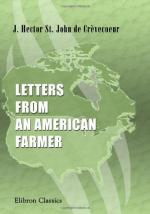and if we remove we become beggars. The property
of farmers is not like that of merchants; and absolute
poverty is worse than death. If we take up arms
to defend ourselves, we are denominated rebels; should
we not be rebels against nature, could we be shamefully
passive? Shall we then, like martyrs, glory in
an allegiance, now become useless, and voluntarily
expose ourselves to a species of desolation which,
though it ruin us entirely, yet enriches not our ancient
masters. By this inflexible and sullen attachment,
we shall be despised by our countrymen, and destroyed
by our ancient friends; whatever we may say, whatever
merit we may claim, will not shelter us from those
indiscriminate blows, given by hired banditti, animated
by all those passions which urge men to shed the blood
of others; how bitter the thought! On the contrary,
blows received by the hands of those from whom we expected
protection, extinguish ancient respect, and urge us
to self-defence--perhaps to revenge; this is the
path which nature herself points out, as well to the
civilised as to the uncivilised. The Creator of
hearts has himself stamped on them those propensities
at their first formation; and must we then daily receive
this treatment from a power once so loved? The
Fox flies or deceives the hounds that pursue him;
the bear, when overtaken, boldly resists and attacks
them; the hen, the very timid hen, fights for the preservation
of her chickens, nor does she decline to attack, and
to meet on the wing even the swift kite. Shall
man, then, provided both with instinct and reason,
unmoved, unconcerned, and passive, see his subsistence
consumed, and his progeny either ravished from him
or murdered? Shall fictitious reason extinguish
the unerring impulse of instinct? No; my former
respect, my former attachment vanishes with my safety;
that respect and attachment was purchased by protection,
and it has ceased. Could not the great nation
we belong to have accomplished her designs by means
of her numerous armies, by means of those fleets which
cover the ocean? Must those who are masters of
two thirds of the trade of the world; who have in their
hands the power which almighty gold can give; who
possess a species of wealth that increases with their
desires; must they establish their conquest with our
insignificant innocent blood!
Must I then bid farewell to Britain, to that renowned country? Must I renounce a name so ancient and so venerable? Alas, she herself, that once indulgent parent, forces me to take up arms against her. She herself, first inspired the most unhappy citizens of our remote districts, with the thoughts of shedding the blood of those whom they used to call by the name of friends and brethren. That great nation which now convulses the world; which hardly knows the extent of her Indian kingdoms; which looks toward the universal monarchy of trade, of industry, of riches, of power: why must she strew our poor frontiers with the carcasses of her friends, with the wrecks of our insignificant




